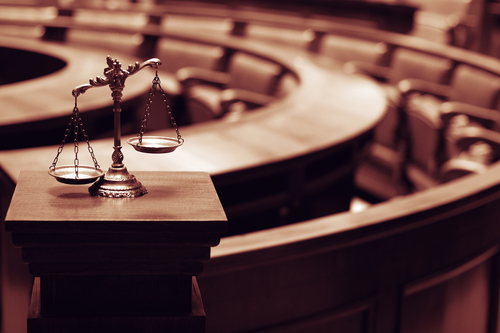Lawyer-juror's outside research entitles man to new trial hearing, appeals court says

Image from Shutterstock.com.
Outside research by a lawyer-juror entitles a convicted Colorado defendant to a hearing on his new trial bid, a state appeals court has ruled.
The Colorado Court of Appeals said the lawyer, identified as “M.O.,” allegedly conducted outside research on character evidence.
“I knew taking the bar would come in handy,” M.O. allegedly said before sharing his information with the rest of the jury.
In its July 23 decision, the appeals court granted a new-trial hearing to Damon Newman, who was convicted of sexual assault. Newman had argued the sex was consensual.
Newman was charged in Colordado after he was arrested in California on an unrelated offense. A DNA sample taken in California matched DNA on the woman who accused Newman of sexual assault at gunpoint.
According to an affidavit by a juror in Newman’s trial, lawyer-juror M.O. produced a piece of paper during deliberations with a definition of law about character witnesses written on it.
M.O. said he had been thinking all weekend about character witnesses not being asked certain questions about Newman’s personality. According to the complaining juror, M.O. said something to the effect of Newman is a bad guy, or they would have asked different questions of the character witnesses.
Jurors are required to consider only evidence admitted at trial and the law as given by the judge’s instructions, the appeals court said. Outside information is prejudicial when it consists of legal content and specific factual information, and it is relevant to the issues in the case.
Any comment about the legal aspects of a case by a lawyer juror is not necessarily legal content, the appeals court said. “If we were to construe the concept of ‘legal content’ so broadly as to encompass any information drawn from a lawyer-juror’s professional background, attorneys would effectively be prohibited from serving as jurors,” the court said.
Rather, legal content consists of statements of law, the court said. When a lawyer-juror introduces a statement of law that is inconsistent with or supplemental to the trial court’s instructions, that statement is outside the record.
The alleged statement about character witnesses is extraneous information that could have swayed a typical juror, the appeals court said.
During an evidentiary hearing, the defendant should be given the chance to produce evidence about the source of M.O.’s information, the way it was acquired and its use in the juror room. The hearing should also consider whether there was a realistic possibility the communication would influence the verdict of a typical juror.
M.O. also allegedly told jurors that Newman was not asked about his sex life because that would have allowed the prosecutor to ask about all the prior accusations or convictions against Newman.
The statement appears to explain, albeit incorrectly, the rules of evidence on prior acts evidence, the appeals court said. Since the alleged statement appears to be an expression of the law, Newman is entitled to introduce evidence on the allegation in his bid for a retrial.
The appeals court did not allow introduction of evidence about these alleged statements by M.O.:
• M.O. agreed with another juror that a DNA sample would not have been taken from Newman unless he committed other felonies. The lawyer only applied his professional background to the record, and the information is not extraneous prejudicial information, the appeals court said.
• Newman had testified he had the phone number of the woman who accused him in his cellphone. M.O. said that if the defense had the phone, they would have presented it as evidence. The lawyer said if the defense did have the phone without introducing it, Newman could sue for incompetent counsel. Any juror could have made the inference about failure to introduce the cellphone, and M.O.’s statement about a possible lawsuit is not relevant to the issues in the case, the appeals court said.
• M.O. allegedly said the complaining witness didn’t have to be at the trial, and she had the power to drop charges. If the sexual assault didn’t happen, she would have walked away, the lawyer said. He also said the woman placed herself in danger of perjury charges and jail time if she was lying. M.O. was simply offering his opinion, and the statements were not statements of law or factual information, the appeals court said.
• M.O. said a nonunanimous verdict would result in a mistrial. A new trial would be required, but that would never happen because the complaining witness would not want to testify again, M.O. allegedly said. M.O. did not make a statement of law and the comments were not related to elements of the charge, the appeals court said.
Hat tip to Colorado Politics, which covered the opinion.



